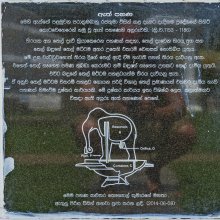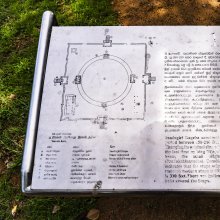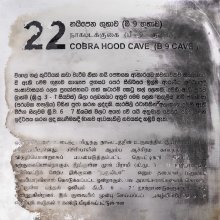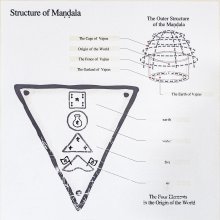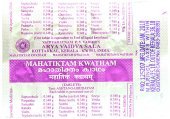Vishala, Viśālā, Visāla, Visala, Viśāla, Visālā, Viṣala: 46 definitions
Introduction:
Vishala means something in Buddhism, Pali, Hinduism, Sanskrit, Jainism, Prakrit, the history of ancient India, Marathi, Hindi, biology. If you want to know the exact meaning, history, etymology or English translation of this term then check out the descriptions on this page. Add your comment or reference to a book if you want to contribute to this summary article.
Vishala has 45 English definitions available.
The Sanskrit terms Viśālā and Viśāla and Viṣala can be transliterated into English as Visala or Vishala, using the IAST transliteration scheme (?).
Alternative spellings of this word include Vishal.
Images (photo gallery)
(+3 more images available)
Languages of India and abroad
Sanskrit dictionary
[Deutsch Wörterbuch]
Source: Cologne Digital Sanskrit Dictionaries: Böhtlingk and Roth Grosses Petersburger WörterbuchViśāla (विशाल):—[Uṇādisūtra 1, 117.] [Pāṇini’s acht Bücher 5, 2, 28.]
1) adj. (f. ā; nach gaṇa bahvādi auch viśālī, das aber nicht zu belegen ist) umfänglich, weit, breit, gross [Amarakoṣa 3, 2, 10.] [Hemacandra’s Abhidhānacintāmaṇi 1429.] [Medinīkoṣa 1. 133.] [Halāyudha 4, 14. 68.] svargaloka [Bhagavadgītā 9, 21.] bhūmi [Mahābhārata 2, 638.] [Rāmāyaṇa 3, 21, 18.] [Mṛcchakaṭikā 173, 17.] dakṣiṇā dik [Rāmāyaṇa 4, 41, 8.] bhuvanatritayodara [Spr. (II) 840.] kosalāḥ [Rāmāyaṇa 2, 50, 1.] uttarāḥ kuravaḥ [4, 44, 82.] niyutayojana (dvīpa) [Bhāgavatapurāṇa 5, 16, 5. 20, 2.] salila [3, 8, 14.] ambudhi [Kathāsaritsāgara 53, 187.] śilā [Rāmāyaṇa 2, 94, 20.] pura [4, 43, 5. 5, 80, 24.] [Meghadūta 31.] radhyā, rājamārga [Rāmāyaṇa 4, 41, 52. 5, 10, 20.] parṇaśālā [2, 100, 18.] agniśaraṇa [3, 6, 4.] bhājana [Hemacandra’s Abhidhānacintāmaṇi 1026.] hasta (kuṇḍaka) [Varāhamihira’s Bṛhajjātaka S. 23, 2.] ulkā śirasi viśālā [33, 8.] candra [47, 17.] taḍidrasanairviśālaiḥ [24, 13.] vidyutkuṭilaviśālā [33, 5.] yūpa [Taittirīyasaṃhitā 2, 1, 8, 5.] Baum u.s.w. [Mahābhārata 13, 4862. 14, 1329.] [Hitopadeśa 9, 3. 80, 14.] [Bhāgavatapurāṇa 8, 2, 19.] mūla [Harivaṃśa 3612.] [Suśruta 1, 63, 12.] nau [Bhāgavatapurāṇa 8, 24, 33.] varman [Gītagovinda 4, 3.] ṛṣabha [Kāṭhaka-Recension 13, 5.] mūrti [Varāhamihira’s Bṛhajjātaka S. 4, 20.] vakṣas [Rāmāyaṇa 4, 2, 11.] [Raghuvaṃśa 6, 32.] śroṇī [Harivaṃśa 7894.] jaghana [Rāmāyaṇa 3, 52, 32.] [Caurapañcāśikā 7.] śṛṅgāntara [Raghuvaṃśa 2, 21.] lalāṭa [Varāhamihira’s Bṛhajjātaka S. 68, 71.] vadana [BṚH. 17, 5.] Augen [Mahābhārata 1, 7705.] [Rāmāyaṇa 3, 26, 26.] [Raghuvaṃśa 4, 13.] [Mṛcchakaṭikā 14, 13.] [PAÑCAR. 3, 5, 9.] bāhū [Mahābhārata 2, 2623.] pakṣau Flügel [Harivaṃśa 12745.] vraṇa [Suśruta 1, 15, 10.] bala Armee [Rājataraṅgiṇī 8, 1624.] chandas [Vājasaneyisaṃhitā 14, 9.] kula, vaṃśa grosses, vornehmes Geschlecht [Spr. (II) 1466. 1734. (I) 2637.] [KĀM. NĪTIS. 1, 2.] tṛṣṇā [Spr. 1946 (II). 2722.] buddhiraviśālā [KĪCAKAVADHA] bei [UJJVAL.] zu [Uṇādisūtra 1, 117.] Am Ende eines comp. voll von: sattva, rajo, tamo [SĀṂKHYAK. 54.] viśālam adv. [Pañcaviṃśabrāhmaṇa 12, 13, 11.] —
2) m. a) ein best. Thier (mṛga) . — b) ein best. Vogel [Medinīkoṣa] — c) eine best. Pflanze [Śabdaratnāvalī im Śabdakalpadruma] — d) Name eines Shaḍaha [Kātyāyana’s Śrautasūtrāṇi 24, 2, 16.] [Aśvalāyana’s Śrautasūtrāni 11, 3, 8.] — e) Nomen proprium des Vaters des Mahidāsa Aitareya [Colebrooke I, 46] (viśala gedr.). eines Sohnes des Ikṣvāku und Gründers der Stadt Viśālā (Vaiśālī) [Rāmāyaṇa 1, 47, 12. fg.] [Rāmāyaṇa] [Gorresio 1, 46, 10. 12. 48, 14.fg.] Sohn Tṛṇabindu’s [Viṣṇupurāṇa 353.] [Bhāgavatapurāṇa 9, 2, 33.] Fürst von Vaidiśa [Mārkāṇḍeyapurāṇa 70, 4. 123, 20. 124, 20. 125, 4.] ein Asura [Kathāsaritsāgara 47, 75.] — f) Nomen proprium eines Gebirges [Mārkāṇḍeyapurāṇa 59, 12.] —
3) f. ā a) Koloquinthe [Amarakoṣa 2, 4, 5, 22.] [Hemacandra’s Abhidhānacintāmaṇi 1157.] [Medinīkoṣa] [Ratnamālā 15.] [Suśruta 2, 65, 3. 77, 14.] Basella cordifolia Lam. und = mahendravāruṇī [Rājanirghaṇṭa im Śabdakalpadruma] — b) Nomen proprium eines Flusses und einer daran gelegenen Einsiedelei, nach den Comm. = badarī [Mahābhārata 9, 2189. 12, 13390. 13, 1730.] [Rāmāyaṇa 1, 61, 3.] [Bhāgavatapurāṇa 4, 12, 16. 5, 4, 5. 11, 29, 47.] — c) ein Name der Stadt Ujjayinī (auch Nomen proprium einer anderen Stadt; s. [UJJVAL. a. a. O.]) [Trikāṇḍaśeṣa 2, 1, 16.] [Hemacandra’s Abhidhānacintāmaṇi 976.] [Medinīkoṣa] [Rāmāyaṇa 1, 45, 9. fgg. 47, 13] (vaiśālī [Gorresio][?). Meghadūta 31. Kathāsaritsāgara 95, 3. 104, 22.] — d) Nomen proprium einer Gattin Ajamīḍha’s [Mahābhārata 1, 3790.] einer Tochter Dakṣa’s und Gattin Ariṣṭanemi’s [GĀRUḌA-Pāṇini’s acht Bücher 6 im Śabdakalpadruma] —
4) f. ī eine best. Pflanze, = ajamodā [Rājanirghaṇṭa im Śabdakalpadruma] —
5) m. n. gaṇa ardharcādi zu [Pāṇini’s acht Bücher 2, 4, 31.] —
6) n. a) Name eines Sāman: venoviśāle [Weber’s Indische Studien.3,237,b.] — b) Nomen proprium eines Wallfahrtsortes (wohl = badarītapovana) [Bhāgavatapurāṇa 10, 78, 19.] — Vgl. kriyā, vaiśālī und vaiśālāyana fgg.
--- OR ---
Viṣala (विषल):—n. = viṣa Gift [Śabdacandrikā im Śabdakalpadruma]
--- OR ---
Visala (विसल):—n. = kisala Blattknospe, junger Schoss [Trikāṇḍaśeṣa 2, 4, 4.]
Sanskrit, also spelled संस्कृतम् (saṃskṛtam), is an ancient language of India commonly seen as the grandmother of the Indo-European language family (even English!). Closely allied with Prakrit and Pali, Sanskrit is more exhaustive in both grammar and terms and has the most extensive collection of literature in the world, greatly surpassing its sister-languages Greek and Latin.
See also (Relevant definitions)
Partial matches: Shala, Vi, Cala.
Starts with (+32): Vishaalan-kaanch, Vishalabajara, Vishalabhamarut, Vishalabuddhi, Vishalacakshu, Vishalada, Vishaladamshtrini, Vishaladatta, Vishaladduka, Vishalagrama, Vishalaka, Vishalakarani, Vishalakayata, Vishalakona, Vishalaksha, Vishalakshi, Vishalakshimahatmya, Vishalakula, Vishalakulasambhava, Vishalalaya.
Ends with: Ativishala, Avishala, Badarivishala, Bhadravishala, Dvishala, Kirtivishala, Kriyavishala, Nandivisala, Panduvishala, Rajovishala, Shrivishala, Suvishala, Tamovishala, Yashovishala.
Full-text (+185): Vishalam, Vishalata, Vaishali, Vishalatvac, Vaishala, Vishalakula, Vishalaksha, Vaishalini, Hemacandra, Cuvicalam, Vishaliya, Vishalapuri, Vaishalika, Vishalavijaya, Vishalika, Vaishaliya, Vaishalayana, Suvishala, Vishal, Vishale.
Relevant text
Search found 72 books and stories containing Vishala, Viśālā, Visāla, Visala, Viśāla, Visālā, Viṣala, Visāḷa, Viśala, Vi-shala, Vi-śala, Vi-sala, Viśalā, Vi-śalā, Vi-śāla, Vīsāla, Viśāḷa, Viśaḷa, Viṣaḷa; (plurals include: Vishalas, Viśālās, Visālas, Visalas, Viśālas, Visālās, Viṣalas, Visāḷas, Viśalas, shalas, śalas, salas, Viśalās, śalās, śālas, Vīsālas, Viśāḷas, Viśaḷas, Viṣaḷas). You can also click to the full overview containing English textual excerpts. Below are direct links for the most relevant articles:
Bhakti-rasamrta-sindhu (by Śrīla Rūpa Gosvāmī)
Verse 4.8.38 < [Part 8 - Compatible & Incompatible Mellows (maitrī-vaira-sthiti)]
Verse 3.3.32 < [Part 3 - Fraternal Devotion (sakhya-rasa)]
Verse 3.3.31 < [Part 3 - Fraternal Devotion (sakhya-rasa)]
Garga Samhita (English) (by Danavir Goswami)
Verse 8.13.4b < [Chapter 13 - A Thousand Names of Lord Balarāma]
Verse 2.11.15 < [Chapter 11 - The Liberation of Dhenukāsura]
Verse 1.4.2 < [Chapter 4 - Description of Questions About the Lord’s Appearance]
Satirical works of Kshemendra (study) (by Arpana Devi)
1.1. Upamā (simile) < [Chapter 4 - Literary study of the Three Satirical Works]
1. Summary of the Kalāvilāsa < [Chapter 3 - Satirical Works of Kṣemendra]
Ramayana (by Manmatha Nath Dutt)
Chapter XLVII < [Book 1 - Bāla-kāṇḍa]
Chapter XLV < [Book 1 - Bāla-kāṇḍa]
Chapter L < [Book 1 - Bāla-kāṇḍa]
Shrimad Bhagavad-gita (by Narayana Gosvami)
Verse 9.21 < [Chapter 9 - Rāja-guhya-yoga (Yoga through the most Confidential Knowledge)]
Verse 11.24 < [Chapter 11 - Viśvarūpa-darśana-yoga (beholding the Lord’s Universal Form)]
The Brahmanda Purana (by G.V. Tagare)
Chapter 61 - A dissertation on Music < [Section 3 - Upodghāta-pāda]
Chapter 16 - The Description of Bharata < [Section 2 - Anuṣaṅga-pāda]
Chapter 66 - Description of Amāvasu dynasty (vaṃśa) < [Section 3 - Upodghāta-pāda]
Related products
(+5 more products available)

